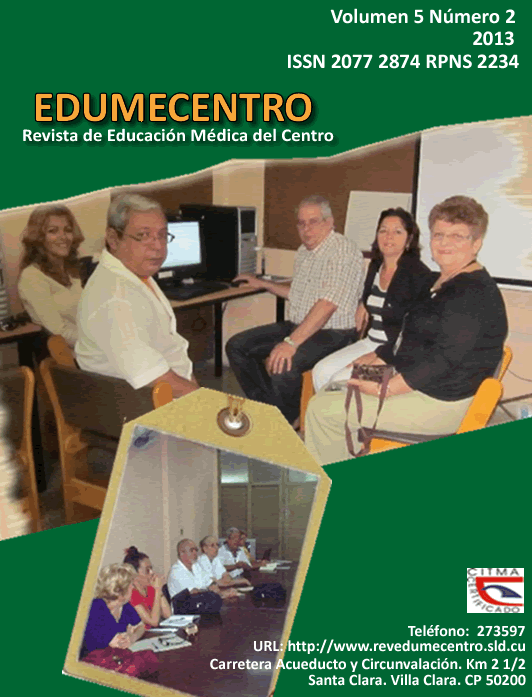Reflections on the implementation of Comprehensive Dentistry VI in Dentistry undergraduate studies
Keywords:
Curriculum, Dentistry, Syllabus, Teachers, Students, Teaching, Learning.Abstract
Background: The improvement of curriculums is a priority strategy of the education system. Methods: A descriptive cross-sectional study was conducted with the aim of characterizing the implementation of the subject Comprehensive Dentistry VI in Dentistry undergraduate studies at the Dental Specialties University Clinic in Bayamo. The study included the period from March 2011 to January 2012, with the participation of six teachers and 87 3rd year students. Theoretical, empirical and statistical methods were used. Results: The main problems that hindered the proper development of the educational process were identified, for instance, different satisfaction criteria from the standpoint of students and teachers, problems in the access to literature, the setting of objectives, and the link with other subjects. Conclusions: All this could be important for the implementation of Syllabus D in Dentistry undergraduate studies, where the contents of this subject will become part of other curricular units with a new nomenclature and a different structure; however, they will be point of reference for a correct teaching management of the curriculum.Downloads
Download data is not yet available.
Published
2013-04-15
How to Cite
1.
Alcolea Rodríguez JR, Abay Debs V, Placeres Collot M, Herrero Escobar P, Rodríguez Zamora C. Reflections on the implementation of Comprehensive Dentistry VI in Dentistry undergraduate studies. EDUMEC [Internet]. 2013 Apr. 15 [cited 2026 Feb. 13];5(2):88-102. Available from: https://revedumecentro.sld.cu/index.php/edumc/article/view/238
Issue
Section
ARTÍCULO ORIGINAL
License
Los autores que publican en esta revista están de acuerdo con los siguientes términos:- Los autores/as conservarán sus derechos de autor y ceden a la revista el derecho de primera publicación de su obra, el cuál estará simultáneamente sujeto a una Licencia Creative Commons Reconocimiento-NoComercial-CompartirIgual 4.0 Internacional (CC BY-NC-SA 4.0) que permite a terceros compartir la obra siempre que se indique su autor y su primera publicación esta revista.
- Los autores pueden establecer por separado acuerdos adicionales para la distribución no exclusiva de la versión de la obra publicada en la revista (por ejemplo, situarlo en un repositorio institucional o publicarlo en un libro), con un reconocimiento de su publicación inicial en esta revista.
- Se permite y se anima a los autores a difundir sus trabajos electrónicamente (por ejemplo, en repositorios institucionales o en su propio sitio web) antes y durante el proceso de envío, ya que puede dar lugar a intercambios productivos, así como a una citación más temprana y mayor de los trabajos publicados (Véase The Effect of Open Access) (en inglés).










